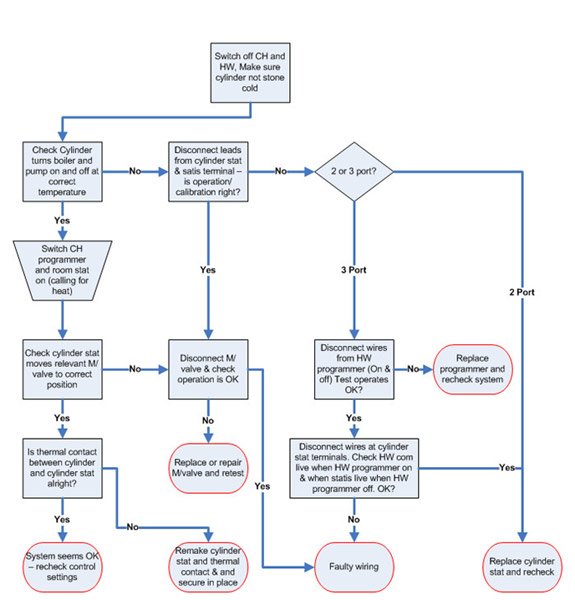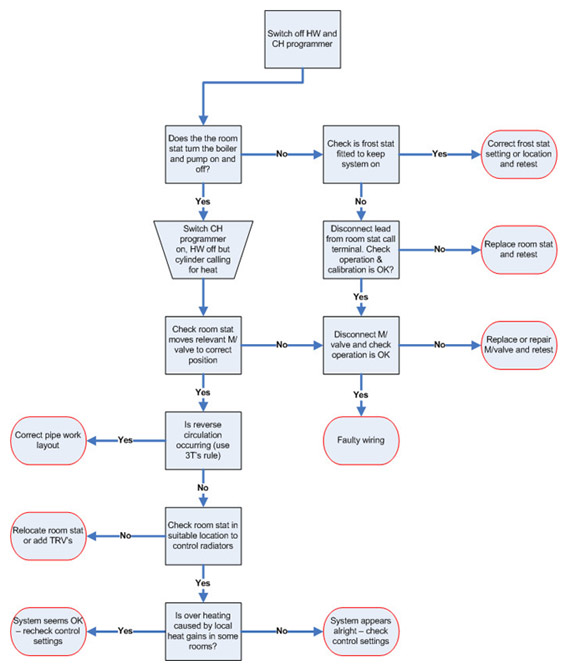If you’re a homeowner or DIY enthusiast with little experience in central heating, you can still diagnose common issues and save on costly call-out fees by following a basic troubleshooting process. This guide aims to help you identify faults affecting your heating or hot water without needing specialised tools or skills.
By understanding the problem and attempting simple fixes within your comfort level, you may be able to resolve minor issues or temporarily patch them until a professional gas engineer can provide a permanent fix.
Work through the points below to help diagnose your central heating system issues.
What Causes Central Heating Issues?
Central heating systems are, for the most part, fairly reliable things and, if installed correctly using good quality components, will run for many years, however annual maintenance and inspection by a qualified gas engineer is certainly required.
In the event that you do experience issues with your central heating system, it’s usually due to one of the following issues:
- 1. Air in the System: One of the most common causes of central heating problems is trapped air or an air lock as it’s known. When air gets into the pipes or radiators, it prevents and blocks the flow of hot water. This results in cold spots on radiators or the system making banging or gurgling noises. Bleeding the radiators can release the trapped air and restore normal circulation.
- 2. Faulty Thermostat: A faulty thermostat can prevent your heating system from reaching the desired temperature or cause it to switch off unexpectedly. Regularly checking and, if needed, replacing your thermostat can help avoid these issues.
- 3. Sludge Buildup in the System: Over time, rust, dirt, and debris can accumulate in the pipes and radiators, forming a thick black sludge. This buildup again restricts the flow of hot water, causing radiators to heat unevenly or not at all. The sludge can also damage your boiler, reducing its efficiency and potentially leading to costly repairs. Flushing the system with a chemical cleaner or using a magnetic filter can help remove the sludge and improve performance.
- 4. Boiler Issues: The boiler is the heart of your central heating system, and any slight fault can disrupt the entire setup. Common boiler issues include low pressure, broken valves, or a malfunctioning pump. Low pressure can be due to leaks or recent bleeding of radiators, while faulty valves may not open and close as needed, restricting hot water flow. Regular boiler maintenance and servicing can help identify and fix these problems before they escalate.
- 5. Incorrectly Set Timer or Programmer: On rare occasions, heating problems can be as simple as an incorrectly set timer or programmer. If your timer isn’t set correctly, your system may not turn on or off when needed. Double-checking the timer settings and ensuring the clock is set to the right time can potentially fix this issue, especially after a power outage or daylight saving time changes.
- 6. Circulation Problems: Poor circulation in the central heating system is another common issue. This can be caused by a failing pump or blocked pipes. If the pump is weak or faulty, it won’t be able to circulate hot water effectively throughout the system, leading to uneven heating or cold spots. Replacing or servicing the pump can help restore proper circulation and improve overall system performance.
Initial Check and Central Heating Safety
A central heating system in the wrong or inexperienced hands can be potentially very dangerous as gas, electricity and hot water are all involved, so to ensure that you are safe when working around such dangers, it’s essential that you observe the correct safety procedures.
We have detailed these in our finding faults with central heating systems that have no hot water or heating, so please jump over and check them out before commencing into this guide further!
Once you have read them in full, you’re now ready to get started diagnosing why your system is producing heating or hot water that’s too hot.
Diagnosing Central Heating Issues: Hot Water Too Hot
If your hot water is overheating, use the table below to identify common causes and then find a quick solution:
Table to Diagnose Hot Water Too Hot
| Possible Cause | Solution |
| Thermostat set too high | Lower it to the recommended 60°C |
| Loose thermostat | Tighten the strap to secure it in place |
| Poor thermostat placement | Clean the area for better contact between the thermostat and cylinder |
| Faulty thermostat switch | Replace the thermostat and test the circuit |
To help further diagnose these issues, follow our step-by-step troubleshooting process in the image below. Use this flow diagram to guide you in ruling out each potential fault.

Flow Chart for Fault Finding when the hot water is too hot. Adapted from Central Heating – Fault Finding & Repair by John Reginald
Diagnosing Central Heating Issues: Heating Too Hot
While overly hot heating might seem welcome during cold winters, it can be an extremely costly problem and may indicate deeper issues with your central heating system.
Use our flow chart below to pinpoint the cause of overheating and find the right solution to fix the issue when your heating cannot be turned down:

Flow Chart for Fault Finding when the heating is too hot. Adapted from Central Heating – Fault Finding & Repair by John Reginald
Central Heating: Fault Finding & Repair Guide
In some cases an issue can be particularly hard to diagnose and in these situations, reliable fault-finding and repair advice can be sought from this reference book by John Reginald. It has been a valuable resource for many of the troubleshooting tips shared in our projects and in teh industry as a whole.
This easy-to-follow guide helps diagnose central heating issues efficiently, making it a handy tool during system breakdowns. Keep it nearby for quick, effective problem-solving, and always review the safety section to ensure safe handling of repairs.
It can be purchased from Amazon and other similar outlets.

Central Heating repair book
Additional Central Heating Faults and Troubleshooting Resources
If you need more details on specific central heating issues, explore these helpful guides:
- Combi Boilers: Learn more about common faults and maintenance tips in our Combination Boilers guide.
- Radiator Issues: Visit our Radiator Problems guide for detailed solutions to common radiator issues.
Although any work needed to a gas boiler should only ever be carried out by a qualified GasSafe engineer, it is possible for anyone to help diagnose the potential cause of any central heating or hot water-related issues, which may help your engineer find a solution quicker and potentially save you money.

